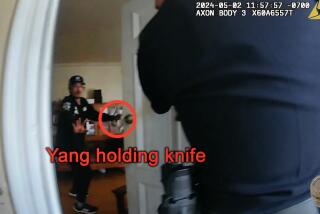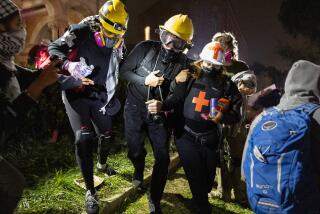Beijing Crowd Keeps Feelings in Check as Troops Beat Up a Resident
- Share via
BEIJING — The Chinese soldiers were beating and kicking the young man outside his apartment complex on Beijing’s No. 3 Ring Road late Tuesday afternoon, as the crowd of gaping commuters along the busy thoroughfare quickly began to swell.
“But I live here,” the young victim shouted to his attackers and anyone else in the crowd who would listen, as he frantically waved his arms to ward off the blows. “I live here.”
The handful of helmeted soldiers, dressed in full battle fatigues and gripping AK-47 rifles, harassed him relentlessly until the crowd finally began pulling him away, over a fence and onto the sidewalk.
“But I live here,” he repeated to a sympathetic woman tugging him into the protective embrace of the crowd. “They won’t let me go home.”
Advice in Hushed Tones
The woman tried to shake sense into him, encouraging him in hushed tones to stay away--far away--until the soldiers, who had blocked off the apartment complex, finished their work. There was nothing else to be done, she said.
Equally helpless was a well-dressed middle-aged man. As he watched the soldiers rain blows and kicks on their hapless victim, he turned to a foreigner in the crowd and, under his breath, said: “I really detest these guys. I hate them so much.”
More than three weeks after troops used tanks and bullets against students and citizens in Beijing to put down demonstrations against corruption and for democracy, no one in the crowd of several hundred on No. 3 Ring Road dared to intervene in the military operation at the apartment complex Tuesday.
But the incident, although a tiny detail in a sprawling capital that once again surges each day with the normal bustle of urban life and commerce, gave a glimpse of the lingering feelings about the People’s Liberation Army that apparently continue to seethe just beneath the city’s surface.
Commenting on the general public mood now that China’s leadership has instituted a nationwide crackdown on the dissidents, one Western diplomat in Beijing said Tuesday, “Obviously, there’s a lot of bitterness, a lot of anger, in the urban population.”
Such sentiments appear to be well known to the army’s leadership, which apparently endorsed the lethal crackdown ordered by hard-liners in China’s Communist Party leadership on the night of June 3-4, when hundreds, perhaps thousands, were killed.
A column in Monday’s Liberation Army Daily, official organ of the Chinese armed forces, was surprisingly candid and critical in its self-reflection.
Under a label, “Martial Law Troops--the Words of Officers and Soldiers,” it quoted soldiers as criticizing colleagues for driving their troop trucks--”vehicles of power and prestige,” the column called them--recklessly and dangerously through the streets.
‘A Lesson Without Reason’
“Some comrades, while on duty, have not been too polite towards the masses,” the column quoted an officer as saying. “They have taught people a lesson without reason.”
And the column’s headline reflected the tightrope the army is trying to balance on--keeping order on the streets and in its ranks while trying to win back popular support. “In the midst of the praise, we ought to be cautious and modest,” the headline warned.
But on the streets of Beijing this Tuesday, that advice had made no converts. The apartment complex where Tuesday’s incident occurred was, in the words of one soldier rudely shoving the crowd out of the way, “a martial law area.” So the operation in progress was none of their business, he shouted at the citizens.
Later, a gentler officer explained that several hundred soldiers at the complex were searching for a sniper who had fired onto the street from a 12th-floor apartment. No civilian eyewitnesses could be found to corroborate the shooting, but few in the crowd felt free to speak.
“We will certainly find him,” the officer asserted, as his soldiers searched each apartment in each of the four 14-story buildings, whose residents are among the wealthier and more privileged families in the capital. Asked when, the officer replied, “Tonight. We will definitely find him tonight.”
In the end, the soldiers did not find their sniper; they gave up their search after midnight. By then, the incident had lasted eight hours.
Outside the apartments, the people in the crowd just watched in silent anger--some of them, like the young man who was beaten, residents who could not go home; others, like most in the crowd, simply cowed into numb obedience.
More to Read
Sign up for Essential California
The most important California stories and recommendations in your inbox every morning.
You may occasionally receive promotional content from the Los Angeles Times.










